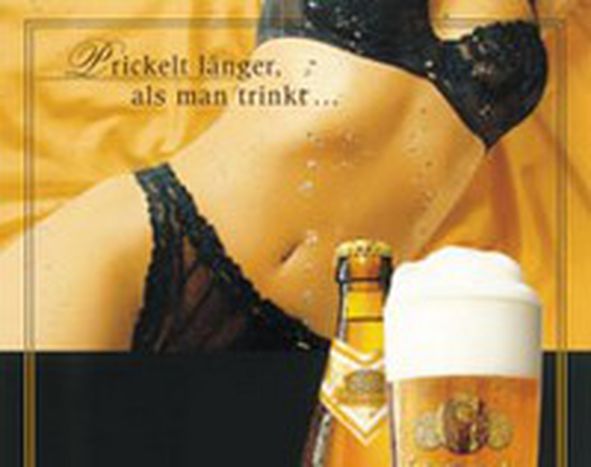
German TV adverts: stEurotypes
Published on
Translation by:
Nabeelah ShabbirIn adverts, stereotypes of countries and nations are often exploited to commercialise certain products – a trip through German television
Zoom to a coffee advert from Germany. Mr. Angelo has allegedly parked his car in a German woman's parking space. When she raps on his door to complain he turns on the Italian charm, strong accent - and cappucino machine - to calm the highly-strung blonde, only to impishly admit later that he 'doesn't even 'ave a carrrr' (ich 'abe garrrrr kein Auto). Not forgetting the sexy French voiceover of a woman in lacy black underwear, lasciviously lolling on a bed by 'Arold for a beer advert.
Cafe or beer aside, more and more companies from various sectors use cliches to present their products with a country-specific image, all over Europe. Ikea Germany's advert which mocked the furniture giant by satirising the traditional Swedish midsummer tradition (dancing around poles every Mayday) was banned by the head office in 2005. Over to Switzerland, everyone in the UK must remember the nineties Riiiicolaaaa yodelling-over-the-Alps advert for 'natural herb cough drops'.
Bad world cup commercials
Controversial they may be, but the punchy adverts are well-loved across the continent. During the rugby world cup in France during the summer of 2007, many plays on lost battles during the second world war were used to advertise British beer advert. 'One code the Germans will never crack' (Ein Code, den die Deutschen niemals knacken werden) relates not only to rugby union rules but also the German code system during the war. Another advert in the series was complained about to the UK Advertising Standards Authority: 'The ad stated __SS German lager (4) in the style of a crossword clue. The letters 'SS' were written in the style of the Nazi SS insignia. - the use of the Nazi insignia in the ad was grossly offensive.'
Another soft drink advert which was screened during the 2006 football world cup in Germany promoted a string of the host-nation's stereotypes, against the backdrop of eighties hit 'Da Da Da (I Don't Love You You Don't Love Me)' by the band Trio. International football stars like David Beckham and Ronaldinho enter a German beer tent and are greeted with Bavarians dancing the traditional 'Schuhplattler', decked out in Dirndl and Lederhosen.
Cliches for sale
Cliches are consciously used in adverts not only negatively. On the one hand they ensure the viewer makes positive associations, such as the good taste of Italians and the French, and on the other hand make viewers have to smile abut often likeable differences. Dr. Teresa Pinheiro, assistant lecturer in 'cultural and social transition' at the technical university in Chemnitz, has done some intensive reseach on the phenomenon. 'Stereotypes offer direction in a complex and heterogenous world. They provide a heuristic approximation to this world,' she says. In general though, when certain characteristics like nationality are associated with specific expectations, it can easily lead to communication difficulties and negative prejudice.
In the last ten years however a small revolution has taken place in the TV spot world – the Europe campaign. Your average European is mobile, travels more often and is increasingly familiar with the culture specifics of his or her neighbouring country. More and more agencies are respecting at the very least the 'key countries' such as the UK, France, Italy, Spain and Germany in their campaigns. In their 2006 'advertometer', the European Interactive Advertising Association (EIAA) save money and promote a Europe-wide message, coming out of their stereotype holes. On the other hand the organisation points to the ongoing difficulty of creating 'one, global message' and openly lament the lack of knowledge about local markets.
Wanted: garlic-breathed drunken homosexual concentration-camp bullfighters
'Strawberry Frog' has long understood the trend. The multinational advertising agency is based in Holland, works in sixteen different languages and counts 350 freelance specialists who are strategically assigned across the world. 'What you have is groups of people with the same mindsets going to the same blogs and sharing on MySpace,' explains creative head Mark Chalmers from English magazine New Media Age. 'National identities are being distributed beyond boundaries.'
It's clear that an advert reaches a wider audience, as a banned German advert from 2006 shows: the multinational electrics chain 'Media Markt' portray 'Polish football fans as clever thieves, who rob the staff of their trouser and leave them in their underwear.' 'Low prices, like the Polish soul' exclaims one Polish customer in the advert, clasping his hand to his heart. Viewers in Poland were outraged.
Do we need a 'sterEUrotype', as Britain's Telegraph journalist Mark Steyn wryly comments, an 'obnoxious garlic-breathed drunken homosexual concentration-camp bullfighter who’s into organised crime'? Or should more cliches collide head-on in adverts, such as Renault are in their advert released in Germany August 2007? The car manufacturer shows four or five examples of 'crash-tests' by using two national stereotypes bump into each other: two Mayday Swedes dance into each other, two Bavarians end up slapping each other and two Sumo-wrestlers crash into each other. In the end the best protection from an accident comes from France, when a French couple walk into each others lips in a French kiss. Chauvinsitic, one might complain. Cliche, shouts another. Ironic that it's not a bias thought up by the French themselves, but from the other side of the Rhein by Hamburg agency Nordpol.
Photo (Schöfferhofer), videos (/ Youtube)
Translated from StEureotypen: Werben mit Klischees



